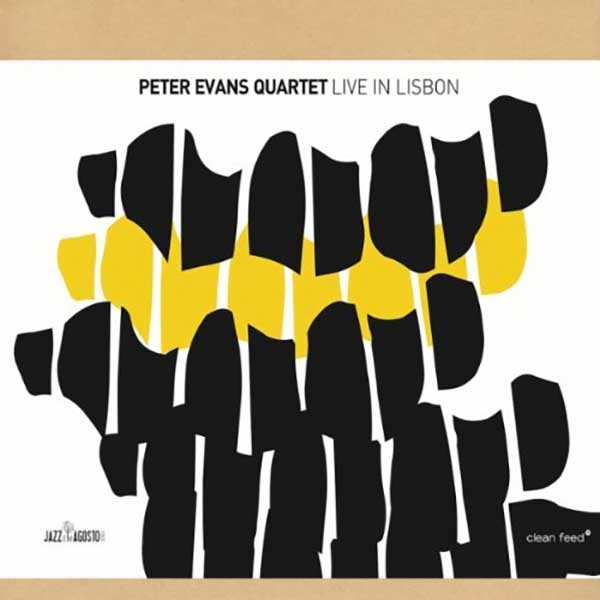
by Tim Owen
November 01, 2010
/ ALBUM
The pleasure of listening to this thrilling concert derives equally from the vibrancy of the material and the zestful drive and immediacy of the group interaction.
Peter Evans Quartet
Live in Lisbon
(Clean Feed)
Peter Evans - Trumpet
Ricardo Gallo - Piano
Tom Blancarte - Double Bass
Kevin Shea - Drums
Peter Evans is undoubtedly one of the most exciting musicians around. Just two of his recent recordings, an outstanding solo double album, “Nature/Culture”, for Emanem in 2008, and his contribution to Mostly Other People Do the Killing’s “Forty Fort” earlier this year (see my review elsewhere on this site), serve to illustrate the remarkable range of Evans’ abilities. While “Nature/Culture” serves to underline the seriousness of his dedication to his chosen instrument, “Forty Fort” shows him apply that discipline in a hugely entertaining, ferociously swinging group context. It’s the mix of the cerebral and the playful that marks Evans out as something special. This new recording, captured at a performance during the 2009 Jazz em Agosto Festival, is another superb addition to the Evans catalogue. Recordist Luis Delgado and mixer Keith Parker both deserve credit for a job well done, since their work has resulted in a sound that marries pungency - this is music you can feel - and exceptional clarity.
Evans is well matched with the others in his quartet. A previous incarnation substituted guitarist Brandon Seabrook for Ricardo Gallo’s piano, which dramatically alters the configuration. Gallo is a Colombian composer and pianist who formerly led his own quartet out of Bogot?. His piano playing, which can be characterised by great delicacy, is frequently animated on this outing by a ferociously hard-hitting tonal fullness and clarion precision. The lucidity with which his touch imbues the melodic aspects of Evan’s themes mitigates some of the complexity of the compositions (of which more later). Tom Blancarte, unlike Gallo, is a regular partner of Evans’, with the two men recording as a duet under the name Sparks. Here, Blancarte’s double bass pulses from a stereo’s woofers with vividness and woody resonance. Kevin Shea, on drums, is quite restrained in contrast to his more usually eruptive, wild-card anarchy, as in his performances with MOPDTK or, more particularly, his own Talibam!. He works hard to make a primarily (though by no means solely) supporting role fresh and unpredictable. A marvellous bass/drums tussle in “Interlude 3” shows this fabulous ?rhythm section’ at their inventive best.
As for that compositional complexity: Evans - in his very worthwhile notes that accompany the CD version of the album - describes his own compositions as “puzzle-like”, and explains that central to his conception is “the continual adaptation and metamorphosis of found materials derived from earlier songs and song forms”. The original composition “All”, for example, references Jerome Kern’s “All The Things You Are”. It is based on Kern’s chord structure, but “any of the tempos referenced in the notation can be maintained by any number of the ensemble members together or separately since they all fit over a basic pulse”. I’m comfortably familiar with Kern’s song in diverse interpretations, and Evans has rendered it as something radically new. It’s only in his respectful nods to the original melody that the debt is overtly heard. Likewise, Evans’ “What” takes Cole Porter’s “What Is This Thing Called Love” and reconstitutes it in ways so inventive that the resultant music is essentially Evans’ own. Evans describes the ways in which the notation permits “components of [the] piece [to] be put on top of each other in various ways without disturbing the general form: a bass line that can double with the trumpet line as the melody, and later, a melody (in the piano and trumpet) of long tones that rests on top of the first line”. “Palimpsest” similarly transcends its roots in the music of Billy Strayhorn’s “Lush Life” and Charles Mingus’ “Duke Ellington’s Sound of Love”, which are explored with a loving appreciation of the beauty that permeates the original compositions. Mingus would surely have approved.
While the originality of his musicianship has frequently been noted elsewhere, I think it’s worth quoting from Evans’ notes in order to reflect the time and intellectual effort that Evans has evidently invested in the evolution of his compositional skills. It’s not necessary to dwell on these details, however, when listening to the results. Although his notes undoubtedly add an extra level of appreciation, what brings the session so vividly and thrillingly to life are Evans’ leadership and the improvisational and interpretive skills of the quartet. The pleasure of listening to this thrilling concert derives equally from the vibrancy of the material and the zestful drive and immediacy of the group interaction.
blog comments powered by Disqus